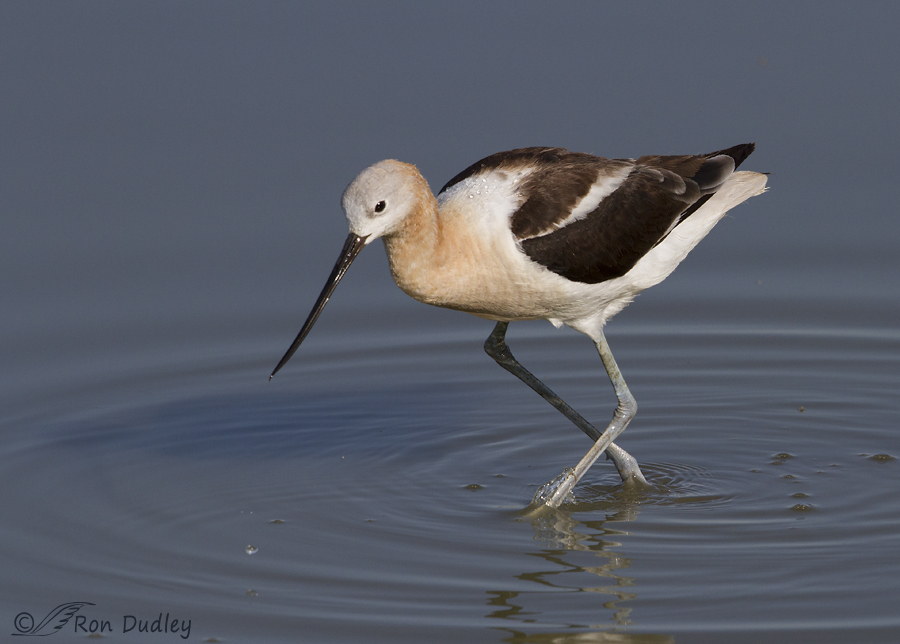Injured birds are always heart-wrenching and I like to help when I can but sometimes attempting to do so isn’t practical or even wise.
1/2500, f/8, ISO 500, Canon 7D, Canon EF500mm f/4L IS II USM, not baited, set up or called in
I photographed this American Avocet several days ago at Glover Pond. At first glance its injury may not be obvious but notice that the joint on its right leg bends the wrong way and opposite that of the normal left leg. That joint (actually the “heel” of a bird’s leg) is apparently either broken or the ligaments are torn or severely hyperextended (I’m no vet or rehabber). The bird could put no weight on its right leg and was feeding by hopping on one foot. Other than that it seemed healthy and acted normally.
In my bird photography activities it’s not unusual for me to encounter injured birds and I often wonder if anything can be done for them so this time I decided to call Dalyn Erickson, Wildlife Specialist at the Wildlife Rehabilitation Center of Northern Utah and find out what, if anything, could be done for this avocet or other birds I may find in the future in a similar situation. Her response was pretty much what I expected – if the bird is “flighted” it’s usually impossible and/or impractical to attempt to capture it. Theoretically it might be captured by firing capture nets at it but doing so carries a serious risk of further injuring or even killing the bird.
The future prospects of this avocet are unclear (at least in my mind) but I’ve seen birds with missing feet and/or legs apparently thrive (see link #1 and #2 if interested) and I have hopes that this bird will learn to adapt. There’s a bull Bison on Antelope Island (we call him “Gimpy”) with a severely broken right-rear leg and he’s survived with that crippling injury for at least three years now. I saw him again a month ago today and he still seems healthy, given his injury.
When I first noticed that bison I thought he’d be dead within days so you never know about this avocet. I do have hopes…
Ron



Always a tough call to “interfere” with Nature. The most common situation I encounter where I try to take action is along the beaches, especially around marinas or piers, where birds have become entangled in fishing line and have difficulty flying. They are usually exhausted from trying to free themselves and it’s possible to catch them. I keep phone numbers for various rehab centers in those areas and the kind workers are usually quick to respond.
Here’s wishing the best for your Avocet!
I observed this avocet today at Glover Pond, east side near the road at the turn. Would probley not noticed the ‘malfunction’, had I not read about it this morning.
That’s exactly where I photographed it three days ago, Val. Thank you for the update!
Thank you Val. Good to hear.
It is a hard call. I have captured birds and taken them to vetinary care. However, by then the care that could be provided is an easier death. Heart-hurting stuff.
I hope that this bird does as well as the bison. Determination and success.
The bird is working at surviving, Elephant’s Child – (see comment above from Val Stock).
It is a hard call, Ron – and I agree with Dalyn. If a bird can fly, sometimes we have to tell finders that there’s nothing we can do until the bird is debilitated enough to be caught – and sometimes that’s too late to be able to fix something, as fractures heal quickly, whether or not they are well aligned. And, sadly, sometimes when they DO come in with an unfixable injury, the choices we have to make are really tough … do we euthanize or do we put him back out there? Yes, he’s been surviving for awhile but what about on migration or during the winter when food is scarcer? Bird banders are an interesting source of information of how amazing birds are: ask them about injuries they’ve seen in free-living wild birds sometime: one-eyed accipiters or birds with only one functioning foot… Injuries that would lead a rehabilitator to feel obligated to euthanize for – as the odds are so steeply against them. Yes, a small percentage may function okay, but the majority would probably starve, and how do we know which would be the survivors?
I hoped you might chime in here, Louise. It makes me feel better that you agree with Dalyn but stuff like this is hard to deal with, as you know as well as anyone. A good friend and birder saw this same bird at Glover Pond yesterday and said it was still doing its thing so I take that as good news for now (thanks for the report, Shyloh).
It’s a hard call, one I can imagine you run into far more often than you’d like…my first instinct is to ask myself, “What CAN I do?”. Then, ” What SHOULD I do.”…never an easy choice, but I think you made the right one. I wish that bird lots of luck…it’s so danged hard to see anything (except for crooked politicians) suffer…makes your heart ache!!!
Thanks, Patty. I’m beginning to wonder if the phrase “crooked politicians” isn’t a redundancy.
Beautiful … I hope he manages to cope with it too …
Me too, Lois…